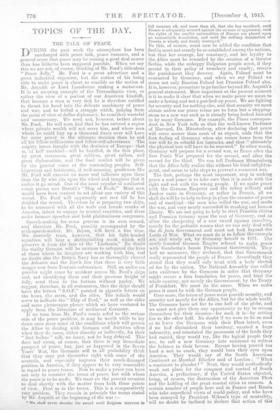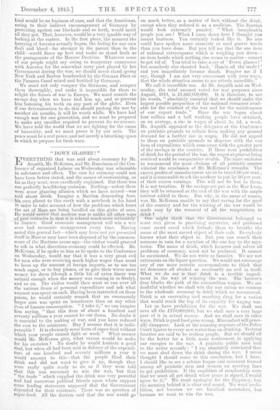TOPICS OF THE DAY
•
THE TALK OF PEACE. DURING the past week the atmosphere has been surcharged with peace talk, peace rumours, and a general sense that peace may be coming a good deal nearer than has hitherto been supposed possible. When we say this we are not, of course, thinking of Mr. Ford's ridiculous " Peace Jolly." Mr. Ford is a great advertiser and a great industrial organizer, but the notion of his being able to make peace is about as sensible as the notion of Mr. Asquith or Lord Lansdowne making a motor-car. It is an amusing example of the Transatlantic view, or rather the view of a portion of our American kinsfolk, that because a man is very rich he is therefore entitled to thrust his hand into the delicate machinery of peace and war, and to forbid a struggle which, judging from the point of view of dollar diplomacy, he considers wasteful and unnecessary. We need not, however, bother about Mr. Ford. Ile will soon find that he has entered a region where private wealth will not serve him, and where men whom he could buy up a thousand times over will have far more power in the ultimate decision than he and all his fellow-millionaires and fellow-self-advertisers. The mighty issues fraught with the destinies of Europe—that is, of half mankind—will be handled, in the first place, by great statesmen, great soldiers, great sailors, and great diplomatists, and the final verdict will be given by the general voice of the contending peoples. Self- important and boisterous, if well-meaning, gentlemen like Mr. Ford will exercise no more real influence upon them than the fly who sits upon the wheel and imagines that it makes it go round. One of the most popular of mediaeval comic poems was Brandt's " Ship of Fools." Most men would have been content to set afloat one variety of this vessel. Mr. Ford will apparently not rest till he has doubled the record. Therefore he is preparing two ships, to be crammed with all the male and female cranks of America, intent to voyage to neutral countries, and there make fatuous speeches and hold platitudinous congresses.
Speech-making for some persons is its own reward, and therefore Mr. Ford, possibly accompanied by the arch-speechsma.ker, Mr. Bryan, will have a fine time. We sincerely trust, however, that his light-headed squadron will bear a distinguishing mark which will preserve it from the fate of the Lusitania.' No doubt the thrifty German will be anxious to safeguard the lives of those whom he imagines are working with him, and no doubt also the British Navy has so thoroughly cleared the Atlantic and the North Sea that there is very little danger now from Teutonic submarines. Still, an under-sea prowler might come by accident across Mr. Ford's ships and, not identifying them and their precious freight of folly, send them to the bottom without parley. We suggest, therefore, in all seriousness, that the ships should have the letters " S.O.F." painted hi gigantic letters on the bows, the stern, and the sides. The initials would serve to indicate the " Ship of Ford," as well as the older and more picturesque phrase which we have ventured to apply from the literature of mediaeval Germany. If we turn from Mr. Ford's comic relief to the serious side of the peace problem, it may be worth while to lay clown once more some of the conditions which will govern the Allies in dealing with German and Austrian offers when they do come, either directly or indirectly, for their " first feelers " will, we fancy, not be long delayed. This does not mean, of course, that there is any immediate prospect of peace, but, just us happened in the Seven Years' War, the Germans will in all probability think that they may put themselve right with some of the neutrals, and especially improve their much-damaged position in America, if they appear to be very reasonable in regard to peace terms. Now to make a peace you have not only to consider the terms of peace, but with whom the peace is to be made. We want on the present occasion to 'deal shortly with the matter from both these points of view. First as to the terms. This is a comparatively easy problem. They remain in principle the terms stated by Mr. Asquith at the beginning of the war :— " We shall never sheathe the sword until Belgium recovers in
full measure all, and more than all, that she has sacrificed, until France is adequately secured against the menace of aggression, until the rights of the smaller nationalities of Europe are placed upon an unassailable foundation, and until the military domination of Prussia is wholly and finally destroyed."
To this, of course, must now be added the condition that Serbia must not merely be re-established among the nations, but that her courage, her constancy, and her loyalty to the Allies must be rewarded by the creation of a Greater Serbia, while the unhappy Bulgarian people must, if they persist in their policy of treachery and cruelty, receive the punishment they deserve. Again, Poland must be evacuated by Germany, and when we say Poland wo mean not only Russian Poland but Prussian Poland also. It is, however, premature to go further beyond Mr. Asquith's general statement. More important at the present moment is it to make it clear that when we make peace we mean to make a lasting and not a patched-up peace. We are fighting for security and for nothing else, and that security we must obtain unless our peace terms are to form but a stepping- stone to a new war such as is already being looked forward to by many Germans. For example, the Times correspon- dent in New York tells us that the well-known Professor of Harvard, D. Mtinsterberg, after declaring that peace will come sooner than most of us expect, adds that the first feeling of Germany when she comes home from the war will be to rebuild her barracks, and that " ultimately the physical test will have to be renewed." In other words, Germany will prepare for a second war, as Rome after the first Punic War prepared for the second, and after the second for the third. We can tell Professor Mfinsterberg that the Allies fully realize this without his kind enlighten- ment, and mean to take steps to prevent a recurrent war. The first, perhaps the most important, step in making peace a real peace is to take care that it is made with the right and not with the wrong people. If we Take peace with the German Emperor and the ruling military and Junker caste in Germany, or rather in Prussia, all we shall do will be to help to keep in Owe the enemies of peace and of mankind—the men who willed the war, and made the war, and very nearly succeeded in crushing out human liberty. We are not going to help to rivet Prussian chains and Prussian tyranny upon the rest of Germany, and to al!ow the sharpening of a new sword against ourselves, merely for the pedantic reason that we can only deal with the de facto Government and must not look beyond the Lords of War. What we must do is to follow the example set, and wisely set, by Germany herself in 1871. The newly founded German Empire refused to make peace with Gambetta's heroic Provisional Government. They had no assurance, they declared, that that Government really represented the people of France. Accordingly they stated that they could only treat with a body elected ad hoc by the nation. The National Assembly was called into existence by the Germans in order that Germany might secure a firm foundation for peace, and bind the whole country, not merely the Government., by the Treaty of Frankfort. We must do the same. When we make peace it must be with the German people. Once more, the terms of peace must provide security, and security not merely for the Allies, but for the whole world. The Germans have set fire to one half of the globe, and we must not give them any opportunity to try to recoup themselves for their disaster—for such it is—by setting fire to the other half. No doubt if we were to be so mad as to leave the Germans with their Fleet intact, even if we had diminished their territory, exacted a huge indemnity, and reinstated the possessors of the lands they had ruined, they would try, like the logical people they are, to call a new Germany into existence to redress the balance in their favour. Europe having proved too hard a nut to crack, they would turn their eyes upon America. They would say of the South American Continent as Marshal Blucher said of London : " What a continent to plunder 1 " Next, they would methodically work out plans for the conquest and control of South America, a preliminary, if the United States objected, being, of course, the destruction of the American Fleet and the holding of the great coastal cities to ransom. A certain number of people hero and in France and Russia who take superficial views of world-policy, and who have been annoyed by President Wilson's type of neutrality, will no doubt be inclined to declare that action of this kind would be no business of ours, and that the Americans, owing to their indirect encouragement of Germany by protesting against our blockade and so forth, would merit all they got. That, however, would be a very ignoble way of looking at the matter. In the first place, the moment the harrying of America actually began, the feeling for our own flesh and blood—far stronger in the parent than in the child—would flame up here and make us stand forth as the protagonists of the Monroe Doctrine. Whatever some of our people might say owing to temporary annoyance with America for the somewhat sorry part played by her Government during the war, we should never stand seeing New York and Boston bombarded by the German Fleet or the Panama Canal seized and fortified by Germany. We must not only conquer the Germans, and conquer them thoroughly, and make it impossible for them to relight the flames of war in Europe. We must muzzle the savage dog when we have tied him up, and so prevent him fastening his teeth on any part of the globe. Even if our determination to do this should prolong the war by another six Months, it will be worth while. We have had enough war for one generation, and we must be prepared to make any sacrifice required to prevent its recurrence. We have told the world that we are fighting for the cause of humanity, and we must prove it by our acts. The peace must be a real peace, and not merely a breathing-space In which to prepare for fresh wars.





















































 Previous page
Previous page